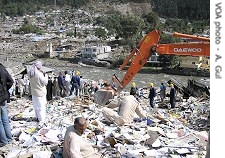 |
| Recovery effort in Balakot,
Pakistan |
Even though no one can predict
when or exactly where an earthquake will strike, scientists say they
believe they may have come up with a way to determine how strong it
will be. Seismologists say such advance warnings could give
communities enough time to prepare for devastating
earthquakes.
Seismologists at the University of California at Berkeley think
they've come up with a way to determine how strong an earthquake
will be based on it's earliest rumblings.
Richard Allen and colleagues have spent the past five years
studying data from 71 around the world earthquakes, and found that
it would have been possible to estimate their magnitude within the
first few seconds of rumbling.
Professor Allen says seismologists measure the first wave of
energy, called the "P wave," that travels across the fault line.
Fault lines are places where the earth is ruptured and shifts.
Professor Allen says the P wave is the fastest in a series of
earthquake waves and it doesn't do much damage. "And so what we're
doing is we're looking at the P wave and we're using that P wave to
tell us about the final magnitude of the earthquake. And we do that
by measuring the frequency content. If it's a low rumble, that tells
us it's going to be a large magnitude event. If it's a high-pitched
squeal, then we know it's going to be a small magnitude event," he
said.
In the study, published in the journal Nature, Richard Allen's
team showed it can predict within one magnitude the intensity of an
earthquake based on the frequency of the P wave.
Depending on where they are along the fault line, Professor Allen
says people could be warned four seconds or more ahead of time of a
large magnitude earthquake. "Obviously, you can get under a desk and
reduce the chances that you'll be injured during an earthquake," he
said.
There are early warning systems in Japan, Taiwan, Turkey and
Mexico that warn of earthquakes moments before they begin. These
slow and stop trains to protect riders, and activate systems within
buildings to withstand the shock of an earthquake.
But they cannot predict the magnitude of an earthquake, according
to Boston University seismologist Rachel Abercrombie. "They're still
pretty unpredictable. There're still a lot of uncertainties," he
said.
For example, Ms. Abercrombie says sometimes an underground fault
can cause another fault line slip. "It moves a bit of fault, and the
next bit of fault says 'Hey, now you've kicked me and I'm going to
move. And I'm going to move.' But there's no way you can tell from
the beginning which pieces of fault were sitting there ready to go,"
he said.
Mr. Allen says he and his colleagues are now setting out to
implement their findings.

